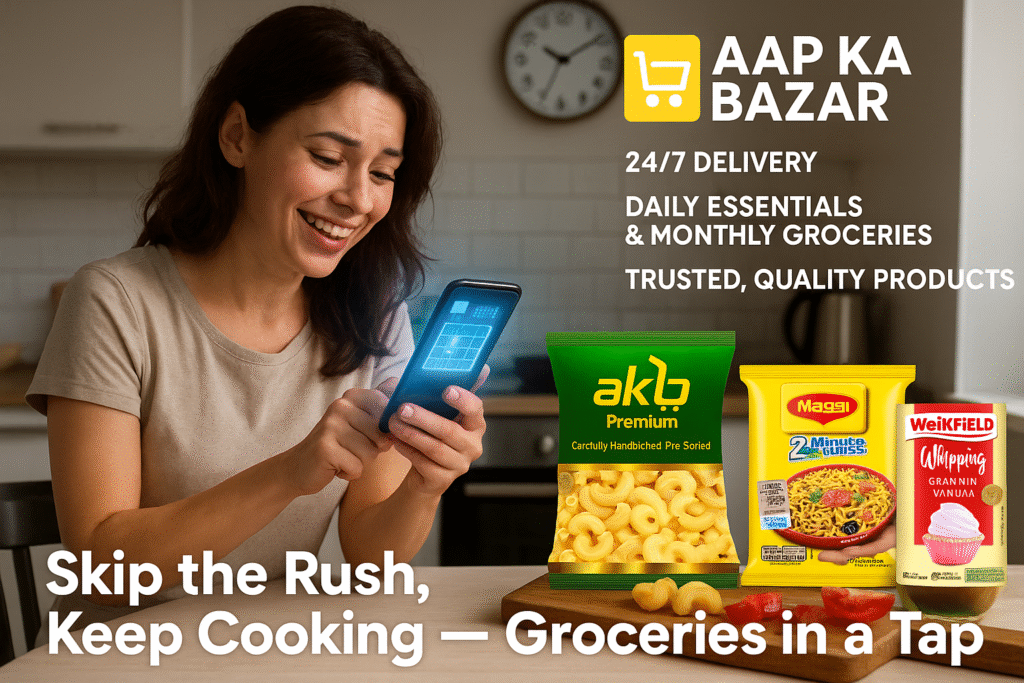
When I shifted to Dwarka Sector 9 a few years ago, I honestly didn’t think much about groceries. I assumed I’d just walk into a supermarket, get my stuff, and that would be it. But if you’ve lived here long enough, you’ll know that grocery shopping isn’t just a chore—it’s woven into the daily rhythm of the place. The way people shop, when they shop, even how they deal with emergencies—it all says something about how life works here.
Online Grocery Shopping Has Its Own Rhythm
If you log in around 7 or 8 in the morning, you’ll notice something interesting. The apps are buzzing with quick-delivery slots, and notifications pop up like a morning alarm: “Buy 1 Get 1 on snacks! Flash deal on detergents!” The screen feels alive with offers, and people are already adding biscuits, rice, and soap to their carts before heading to work.
By afternoon, the pace shifts. That’s when pantry staples and household items see the most action. The apps may look simple, but they hold everything—flours with bundle deals, chips in family packs, cleaning supplies, even those tiny sachets of shampoo you thought only corner shops carried. And the app? It quietly remembers your preferences—your favorite brand of tea or which pack of cookies your kids go through fastest.
By evening, it’s a different story. Families sit together scrolling through lists—it feels less like chores and more like planning a weekend treat. Kids suggest chocolates or cereals, while parents compare whether to stick with branded oil or go with a cheaper option on sale. Sometimes, it’s less about shopping and more about deciding together.
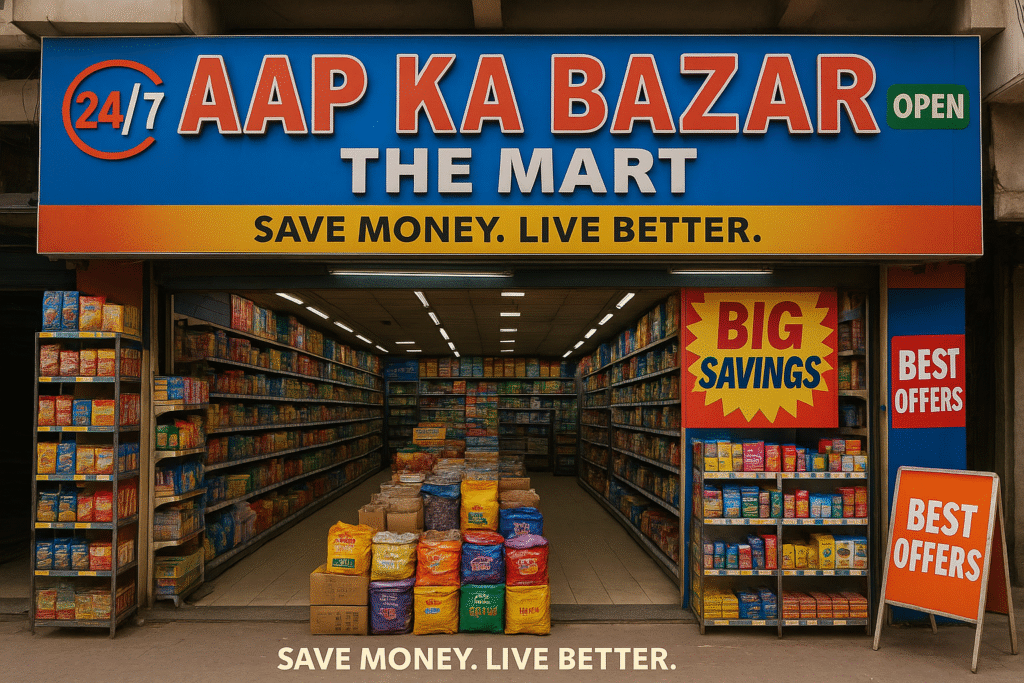
Why Shoppers Stick to Online Grocery Apps
Supermarkets are tidy, sure, but ask any frequent user and they’ll tell you: online apps just feel easier.
- Delivery comes to your doorstep—no hauling bags through traffic.
- Discounts are smarter. Who bargains in a store when apps do it for you?
- Regular buyers get loyalty points and cashback offers.
- Prices often beat local stores, especially during flash sales and bulk buys.
But here’s the trick—don’t wait too long to order. The best deals vanish fast, and popular products run out before evening.
The “How to Save” Playbook Everyone Knows
Nobody hands you a guide when you move here, but over time, you pick up tricks. Buy your grains and oils in bulk. One big purchase saves you a lot compared to smaller packets.
-Daily essentials? Always from trusted apps, not overpriced supermarkets.
-Keep some cash. UPI works, but vendors sometimes round bills down when you pay in hand.
-Festival time = discount time. Diwali, Eid, Holi—you’ll find offers that are actually worth it.
-Mix it up. Don’t stick to one place; split your shopping. It’s how locals balance freshness and budget.
I learned the hard way. My first month here, I did all my shopping from a supermarket. My bill shot up. Then a neighbor told me, “Go to the Aap ka bazar and ” Boom I—saved almost 1,500 rupees in a single month.
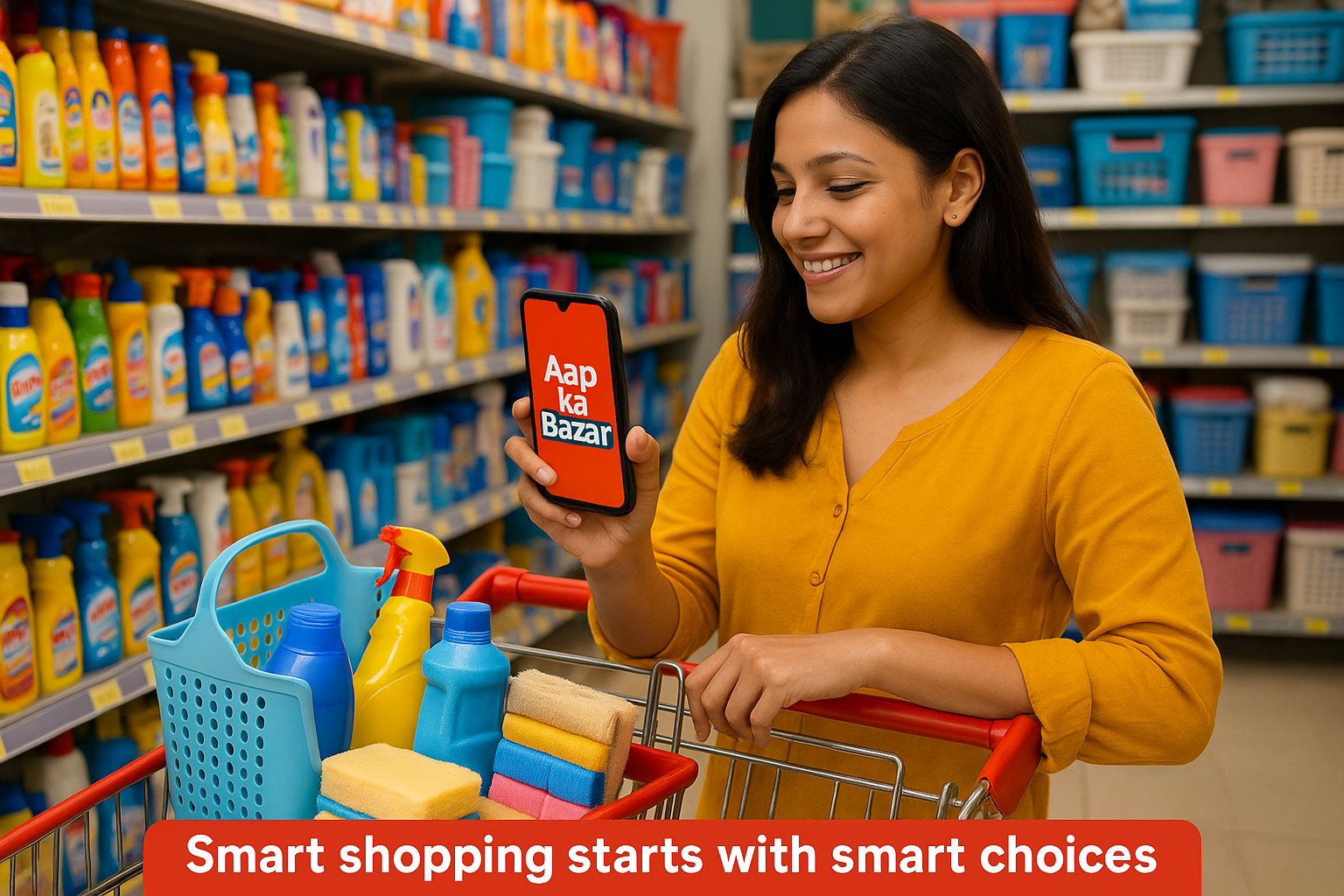
Healthy and Organic Are Slowly Coming In
A few years ago, if you wanted organic oils or sugar-free stuff, you had to travel to South Delhi. Now, Sector 9 is catching up:
-Small organic stalls appear in markets once or twice a week.
-Supermarkets near Delhi, here now stock diet snacks, sugar substitutes, even gluten-free atta.
-Vendors of Supermarkets like Aap ka bazar have started selling desi ghee, fresh masalas, and cold-pressed oils right from pushcarts.
It’s not a huge movement yet, but if you’re health-conscious, you won’t feel left out anymore.
Special Needs, Special Shops
That’s the thing about this place—it adapts.
-Halal-certified shops are there for families that need them.
-Students lean on frozen meals, Maggi, parathas—supermarkets and convenience stores keep them in stock.
-Imported sauces, chocolates, and even Korean noodles? You’ll find them in a couple of supermarkets.
-Families with kids prefer bigger shops because they can get cereals, snacks, and baby food in one go.
No matter your lifestyle, you’ll find a corner here that caters to you.
When Emergencies Strike
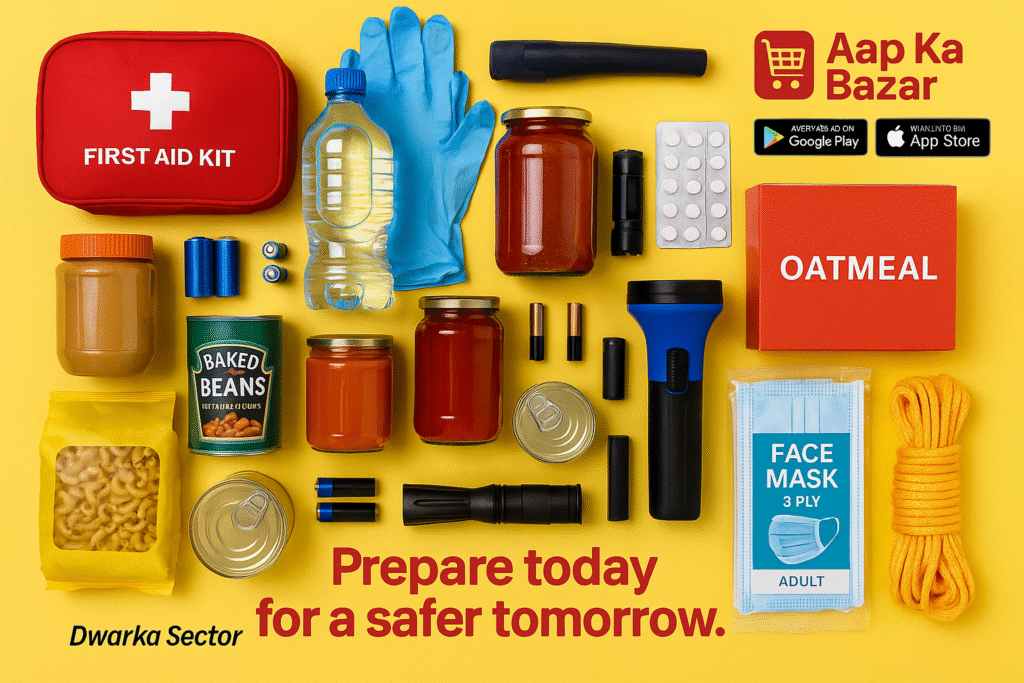
Here’s where Sector 9 really earns respect. Because honestly, who hasn’t run out of milk late at night? Or suddenly realized there’s no oil when guests are already at the table?
-Convenience stores near the metro or in market complexes stay open past midnight.
-Regular kirana shops sometimes deliver if you give them a call—they know their customers.
-Grocery delivery apps tied to local stores can drop things at your door in 20 minutes.
-A few shops also keep bandages, Dettol, and basic medicines.
One time, I needed baby formula at 10:45 at night. I thought I was doomed, but a small convenience store had it. That night changed how I see these tiny shops—they’re lifesavers, literally.
Families, Students, Elders—Each Shop Differently
-Families: One big monthly haul at the supermarket, then bulk of grocery shopping daily.
-Students: Small packs, frozen food, snacks—they need speed, not stock.
-Elders: Mostly kirana shops, often delivered at home.
It’s fascinating to see one area handle such different shopping styles so easily.
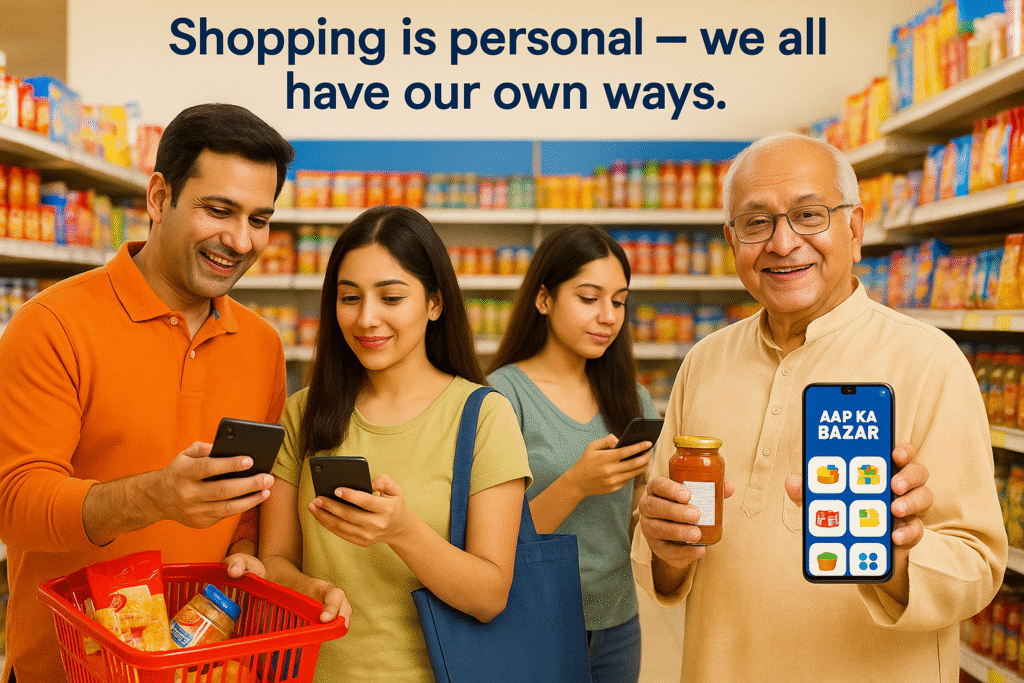
Where Supermarkets attached with online Apps Step In
There are days when you don’t want to hop from cart to cart. That’s when supermarkets matter. And in this area, Aap Ka Bazar is the one people often recommend.
-Prices are fair, not inflated like some big chains.
-Festival discounts are worth waiting for.
-Layout is simple—you don’t waste time hunting for things.
Ask any new resident where to go first, and you’ll hear Aap Ka Bazar in the answer.
The Digital Layer
The old and the new blend here. UPI is accepted almost everywhere now. Some shops take orders on WhatsApp. And of course, delivery apps connect to nearly every store in the area. It makes life simpler, especially on days when stepping out feels impossible.
Smart Online Shopping Tips That Work
Early morning = best time to grab fresh delivery slots.
Late evening = flash sales and app-exclusive discounts (stocks clear fast).
Avoid bulk-buying snacks close to expiry; check dates carefully to prevent wastage.
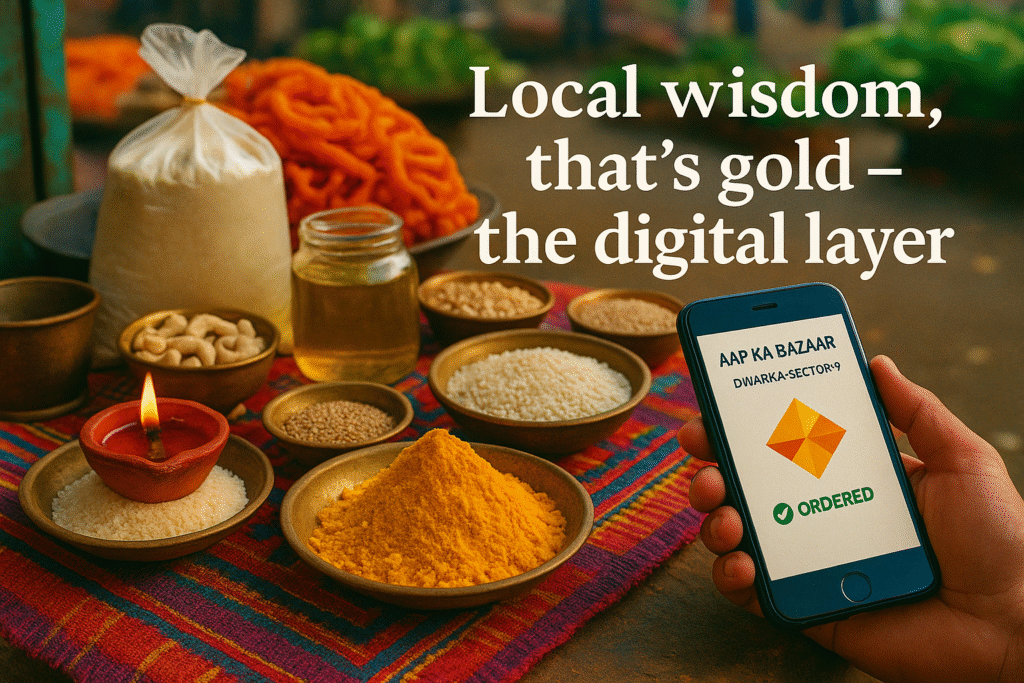
Keep an emergency stash of rice having 12 % off this festive season , atta, dal, and oil—you’ll thank yourself later.
Stick to one grocery app. Its recommendations often know your needs better than random browsing.
Final wordings
Living in Dwarka Sector 9, you realize groceries aren’t just about buying food. They’re about community, rhythm, and convenience. You’ve got the buzz of busy local stores, the ease of online shopping, the order of supermarkets, and the safety net of 24/7 stores when life throws surprises. If you are finding the best grocery shop near in sector 9 of Dwarka for availing wonderful offers and discounts , i will definitely recommend for Aap ka bazar , many daily essential needs have 20 to 30% on them like cookies , perfumes , rice plus buy one get one free offers as well.
Once you pick up the local tricks, shopping stops being stressful. It becomes part of what makes life here connected, reliable, and oddly comforting.

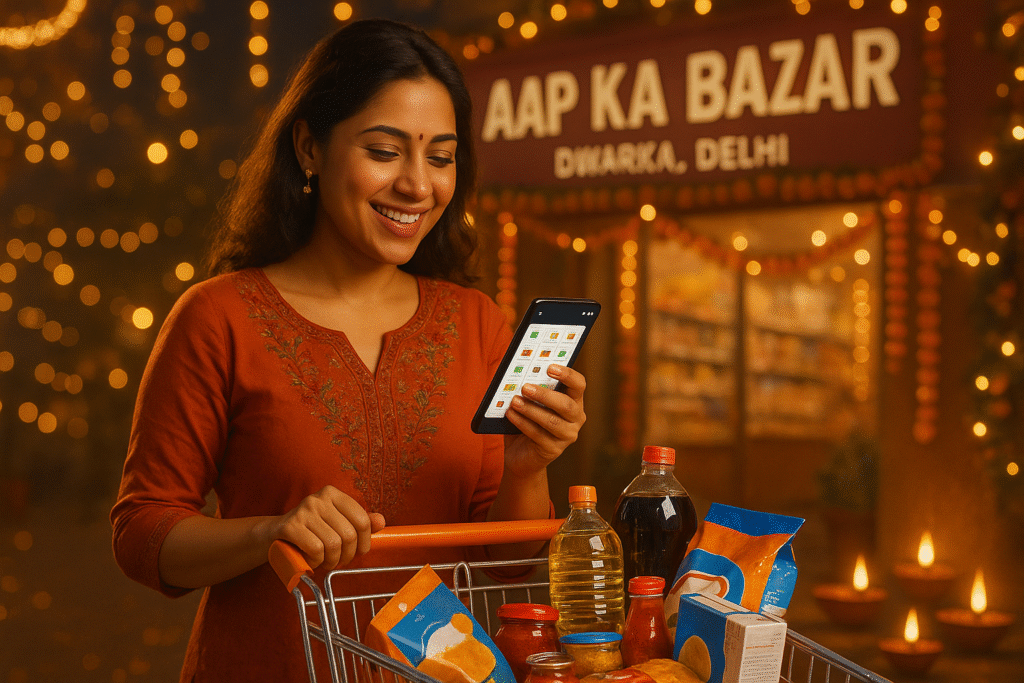


I love how the article captures the chaotic, vibrant spirit of the local markets! It’s like a wild grocery adventure where you never know what trick will save you money or what hidden gem you’ll find. The mix of old-school haggling and shiny UPI payments just adds to the fun. Definitely makes me miss the hunt for the best deals!
Haha, finally someone explained the *real* battle in Dwarka Sector 9! Its all about the apps versus the aisles, isnt it? My wallet certainly knows the difference! Though, learning to mix it up and use those pushcart ghee stashes? Brilliant! And those late-night kirana heroes? Absolute legends, like 24/7 emergency food wizards. Honestly, living here, you realize your local shop isnt just a shop – its the unsung hero of our busy lives, even if you do sometimes just grab a paratha on the fly because, well, why not? Great read, made me appreciate the chaos (and the savings) a little more!sample wedding vows
Haha, living in Dwarka Sector 9 is like a grocery adventure! This article nails it – those online apps are my heroes for avoiding the supermarket circus. But honestly, the real trick is mastering the flash sales before they vanish like organic ghee at a fancy stall. Learning to split shopping like a local? Now thats a survival skill! And those 24/7 shops? Pure magic for midnight emergencies when youre out of everything except wit. Just remember, whether youre a family bulk-buying or a student grabbing Maggi, theres a shop for you. Just dont blame me when your UPI bill spikes after hitting *all* the Buy One Get One Free offers! Thanks for the guide, though – Aap Ka Bazar does sound like a locals best friend.
Wow, this article is spot-on! Living here is like a grocery shopping adventure – you never know what you’ll find around the next corner. From the lifesavers at 11 PM to the clever bulk-buying tricks, its all there. Honestly, I nearly froze when I realized I was out of oil for Dosa Day, but thankfully, a nearby shop came to the rescue! And Aap Ka Bazar?简直是购物天堂!The discounts are insane, and the buy one get one free offers are like a party in my wallet. Just wish I could get my UPI to work everywhere – old habits die hard! But seriously, this guide is a must-read for anyone navigating the amazing chaos of Dwarka Sector 9 grocery scene. Youve got to love it!
This is really insightful! It’s fascinating how you’ve captured the rhythm of grocery shopping in Dwarka Sector 9, from the early morning rush on the apps to the evening family browsing.
I particularly appreciate the details on how online shopping has evolved to become so integrated into the daily routine—and the great tips like buying grains and oils in bulk and checking out the local vendors for fresh produce to save money.
It sounds like Sector 9 is really catering to all needs, with the rise of organic stalls and shops stocking diet and special-needs items. Great information for anyone living there or planning a move!This is really insightful! It’s fascinating how you’ve captured the rhythm of grocery shopping in Dwarka Sector 9, from the early morning rush on the apps to the evening family browsing.
I particularly appreciate the details on how online shopping has evolved to become so integrated into the daily routine—and the great tips like buying grains and oils in bulk and checking out the local vendors for fresh produce to save money.
It sounds like Sector 9 is really catering to all needs, with the rise of organic stalls and shops stocking diet and special-needs items. Great information for anyone living there or planning a move!